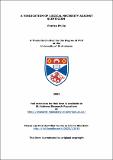A vindication of logical necessity against scepticism
Abstract
Some philosophers dispute the claim that there is a notion of logical necessity involved in the concept of logical consequence. They are sceptical about logical necessity. They argue that a proper characterisation of logical consequence - of what follows from what - need not and should not appeal to the notion of necessity at all. Quine is the most prominent philosopher holding such a view. In this doctoral dissertation, I argue that scepticism about logical necessity is not successful. Quine's scepticism takes three forms. Firstly, he is often interpreted as undermining, in his classic paper 'Two Dogmas of Empiricism', the very intelligibility of notions such as meaning, necessity, and analyticity. If the notion of necessity is meaningless, it is clear that ascriptions of logical necessity are also meaningless. In the thesis, I defend Quine's criticism of these notions by situating it in its historical context and emphasising that the real target in those writings is not the intelligibility of these notions as such, but only their Platonistic interpretation. I agree with Quine that a good theory about meaning, necessity, or analyticity must avoid such an ontological commitment. Secondly, Quine advocates, in the same paper, a holistic picture of knowledge and claims that in this picture, ascriptions of logical necessity are superfluous. I then show that holism a la Quine is committed to admit the necessity of statements of logical consequence. Thirdly, there is Quine's substitutional account of logical consequence (as exposed in his (1970)). He contends that this theory makes no use of logical necessity, thus showing its superfluousness. I show that any plausible account of logical consequence needs to appeal to logical necessity, thus undercutting Quine's claim - and, more generally, undercutting scepticism about logical necessity.
Type
Thesis, PhD Doctor of Philosophy
Collections
Items in the St Andrews Research Repository are protected by copyright, with all rights reserved, unless otherwise indicated.

